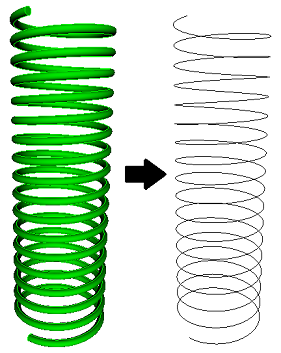
Cubit 16.04 User Documentation
The Reduce Spring command is intended to prepare a volume identified as a spring for analysis by creating one or more free curves that follow the spring's path at the middle of its cross-section. The new curve(s) can be meshed with beam elements and used in place of 3D elements to represent the spring.

Figure 1. Example before and after of the Reduce Spring command
Syntax:
Reduce Volume <ids> Spring [combine] [mesh [size {<value>}]] [keep]
[block_id {<value>|Default}] [increment_block_id] [block_name {<string>|Default}] [preview]
Discussion:
volume ids: Specify the ids of the volumes to be reduced. The Geometry Power Tool classification diagnosic can be used for identifying volumes as "springs".
combine: By default, the curves resulting from the reduce spring command will be based upon the initial surface geometry of the spring. This may result in multiple curves of varying lengths connected by vertices. The combine option reduces the spring to a single free curve. This is helpful if the default operation would otherwise result in short curves that would produce unacceptable beam elements.
mesh: Use the mesh option to automatically mesh the resulting curve(s) with beam elements. The optional size argument can be used to specify a target length for the beam elements along the curve(s). If a size is not specified, an automatic size is assigned.
keep: Optionally retain the initial spring geometry after the reduce command is completed. If keep is not used, the spring volume will be deleted when a valid set of mid-curves has been produced.
Block ID and name assignment:When the block_id or block_name options are used, the resulting curves and mesh may be assigned to a block. The block may be defined by either a block_name or block_id. If the block does not yet exist, a new one will be created. The Default option will automatically select an id or name.
increment_block_id:When reducing multiple spring volumes in a single reduce command, it may be desirable to change the block ID assignment with each spring. When assigning new curves or beam elements to blocks, the block ID can be automatically generated by incrementing from a specified block_id. For example, if block_id is defined as 100, and the increment_block_ids option is used, each new set of mid-curves and their associated beam elements generated for a unique spring volume will be assigned to a new block id starting with 100. The next spring volume will be block 101, followed by 102, 103, etc.
The following figure illustrates the spring option for the reduce command.
|
(a) |
(b) |
|
Initial CAD geometry |
reduce volume 1 spring combine mesh size 0.001 block_ID Default |
Figure 2. Example of using the reduce spring command where (a) is the original geometry of a spring. In (b), the spring option has been used which in this case replaces the spring volume with a single free curve meshed with beam elements. A new block is generated and assigned the resulting curve and beam elements and the original spring geometry is deleted leaving only the free curves in place of the volume.